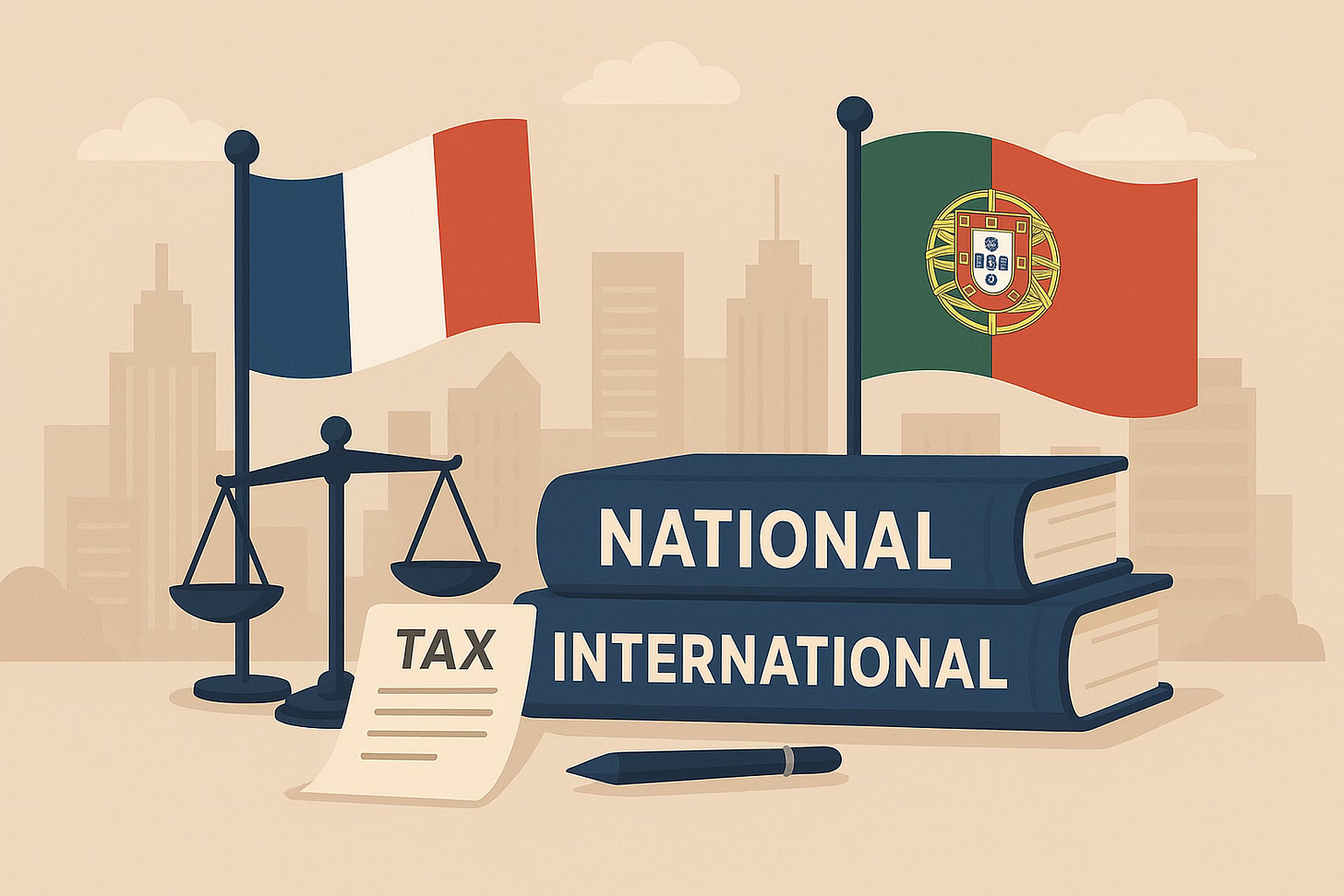How to Avoid Being Taxed Twice When You Move Abroad (Most People Get This Wrong)
And Why The 183-Day Tax Rule is a Complete Myth
Note : This article is the 2nd in a series on how to significantly reduce your tax bill and maximize your freedom by moving abroad. Here are the first articles in the series :
Let's talk about this essential subject for establishing your sovereignty. The aim here is not to replace the advice of a tax lawyer - I strongly recommend that you consult one to validate your organization - but to give you the basics you need to understand how international taxation works, and avoid certain common mistakes.
The basic thing to understand is that there are two levels:
National laws
International treaties
And the first principle to understand is this: national criteria for determining who is a tax resident are specific to each country, and often differ from country to country.
Second principle: international treaties always prevail over national laws.
But wait, international treaties? How could our case be covered by a treaty between two countries?
To understand this, let's take a simple example between two countries: France and Portugal.
First, let's look at national laws.
Criteria for becoming a tax resident in Portugal (and therefore paying taxes there)
Portugal has very simple and precise criteria, compared with many other countries, since you become a tax resident:
if you stay in Portugal for at least 183 days, consecutively or not, in any 12-month period
OR if you have a home that you intend to occupy as your habitual residence, regardless of the number of days you spend in Portugal.
If you meet only one of these criteria, you are considered a tax resident in Portugal.
Criteria for becoming a tax resident in France (and therefore paying taxes there)
The criteria for France are a little more complex1 :
You have your home in France or, if you don't have a home there, your main place of residence.
You have your home in France if you live there habitually and permanently with your spouse (or PACS partner and possibly your children) or alone.
If you do not have a home, the place where you are staying will be determined by your actual presence in France.
You have a salaried or self-employed professional activity in France, unless this activity is carried out on an ancillary basis.
You work in France as your main occupation if you devote the most effective time to it.
You have the center of your economic interests in France
A person whose French-source income exceeds his or her foreign-source income thus has the center of his or her economic interests in France.
Note: you can see that, in the case of France, the famous 183-day criterion is not mentioned at all, even though it is the first criterion put forward by uninformed people who have just done a quick search on the subject. In fact, very few countries explicitly mention these 183 days (Portugal is an exception). We'll see why next.
Any conflicts?
If you've read the criteria carefully, you can already see that there can be situations that are... conflictual, to say the least.
Let's look at several scenarios to see how these conflicts can be resolved.
Let's imagine you're a French resident moving to Portugal.
You own a company in France, run by a manager, and own real estate. All your income comes from French sources.
You discover Portugal and fall in love with the country.
Scenario 1
You buy a house in Portugal, move in with your spouse and children, and live there seven months a year. You go to France for three months a year, and spend the remaining two months traveling.
Who, Portugal or France, considers you a tax resident?
Let's look again at the criteria shared above:
Portugal
More than 183 days a year in the country: Yes. You are therefore a Portuguese tax resident. No need to look at other criteria, but we'll do so for the sake of completeness.
You have a home that you intend to occupy as your habitual residence: Yes.
So that's it, you're a Portuguese tax resident, and that's the end of it, isn't it?
Not so fast. Let's look at the situation in relation to France.
France
You have your home there or, if you don't have a home, your main place of residence: no, because your home (your family) is now in Portugal, and as you spend more than six months of the year in Portugal, your main place of residence is clearly there.
You carry out a paid or unpaid professional activity in Portugal, unless this activity is carried out on an ancillary basis:
No if you are the owner of your company and do not carry out any activity there, or no main activity.
Yes if you are an owner who still plays an active role in your company, despite the presence of the manager.
You have the center of your economic interests in France: Yes, because most (and in this case all) of your income comes from France.
A single criterion is enough to make you a French tax resident, but in this case, you meet one or two criteria, so you're also considered a French tax resident.
What happens then? Will you have to pay taxes in both countries?
I'll let you think about the solution: I'll reveal it a little further on, but first let's look at another scenario.
Scenario 2
You buy a house in Portugal, move in with your spouse and children, and live there for five months a year. You spend five and a half months a year in France, mostly in a residence you've kept, and spend the remaining six weeks traveling.
And you still have your company in France, and all your income comes from there.
Who, Portugal or France, considers you a tax resident?
Let's look again at the criteria shared above:
Portugal
More than 183 days a year in the country: No.
You have a home that you intend to occupy as your habitual residence: Yes.
You are therefore a Portuguese tax resident.
France
You have your home there or, if you don't have a home, your main place of residence: yes, because you spend more time in France than in Portugal, so France is your main place of residence.
You carry out a salaried or non-salaried professional activity in France, unless this activity is carried out on an ancillary basis:
No if you are the owner of your company and do not carry out any activity there, or no main activity.
Yes if you are an owner who still plays an active role in your company, despite the presence of the manager.
You have the center of your economic interests in France: Yes, because most (and in this case all) of your income comes from France.
So you're also considered a French tax resident.
The solution
It's when there's a residency conflict, as here, that we look to international treaties, and in particular the tax treaty signed between the two countries, which lays down precise rules for settling this kind of situation.
Because it would obviously be unfair to ask someone to pay tax twice.
We can therefore examine the tax treaty between France and Portugal2 to see what rules apply in the two scenarios described above.
Here are the terms of the treaty concerning us, which I have slightly edited to make them more readable:
"Where an individual is considered a resident of each of the Contracting States, the case shall be resolved in accordance with the following rules:
Such person shall be deemed to be a resident of the State in which he has a permanent home available to him. If he or she has a permanent home in both States, he or she is considered a resident of the State with which his or her personal and economic ties are closest (center of vital interests).
If it is not possible to determine the State in which the person's vital interests are centered, or if the person does not have a permanent home in any of the States, he or she is considered a resident of the State where he or she has an habitual abode.
If he has an habitual abode in each of the States, or in neither of them, he shall be considered a resident of the State of which he is a national.
If such person possesses the nationality of each of the States, or if he possesses the nationality of neither of them, the competent authorities of the States shall settle the question by mutual agreement."
Note that these are classic criteria, found in a large number of tax treaties.
Here's a little exercise: how are the two scenarios above resolved with these rules? Which country do you become the sole tax resident of in each scenario?
Take a few moments to find out.
No, I insist, really do it :).
OK, got it? Perfect! Here's the solution:
Solution to scenario 1 - 7 months a year in Portugal, 3 months a year in France
Let's go back to the beginning of rule 1: "Such person shall be considered a resident of the State in which he has a permanent dwelling place."
In this scenario, you have a permanent dwelling in Portugal and not in France: Portugal therefore prevails - no need to look at the other rules - and you are solely a Portuguese tax resident.
Note, however, that according to the treaty, you will still have to pay tax on your real estate income in France (although you are partially exempt from social security contributions), and that your company dividends are taxed in Portugal, but that France may levy a withholding tax of up to 15%, which is then deducted from any Portuguese tax (at the time of writing, the withholding tax in this case is 12.8% in France - a far cry from the 30% "flat tax" payable by French residents).
Scenario 2 solution - 5 months a year in Portugal, 5.5 months a year in France
Let's go back to the beginning of rule 1: "Such person shall be deemed to be a resident of the State in which he has a permanent dwelling place."
Here, you have a home in both countries, in the form of a residence at your disposal.
Let's read on: "Where a person has a permanent dwelling place in each of the States, he shall be deemed to be a resident of the State with which his personal and economic ties are closer (center of vital interests)".
Here's where things get complicated:
Your economic ties are stronger with France
You could say that your personal ties are stronger with France, since you spend more time there, but you could dispute this by arguing that you have more friends in Portugal, that your children go to school there while you're in France mainly on vacations, that you're a member of a sports club in Portugal and not in France, etc. Let's say you're right.
Let's assume that you win on this point, making the administration admit that the center of vital interests is difficult to determine. Let's look at the following criterion: "If the State in which the person has the center of his vital interests cannot be determined, or if he does not have a permanent dwelling in any of the States, he shall be deemed to be a resident of the State in which he has his habitual abode."
Now it's clear: since you spend more time in France, under the treaty you're considered a French tax resident, not a Portuguese one.
Note that it's not that complicated to avoid this: instead of spending five months a year in Portugal and five and a half months in France, do the opposite. In this case, you remain a Portuguese tax resident.
Alternative scenario
This is a variation on scenario 2: you buy a house in Portugal, move in with your spouse and children, and live there for five months a year. You spend five and a half months a year in France, but this time in a different place each time (Airbnb, hotel), and spend the remaining six weeks traveling.
You might think, here, that you only have one permanent home - in Portugal, because you have a residence there, whereas you change residences every time you go to France.
Yes, but the fact that you spend more time in France than in Portugal entails a risk that the French tax authorities will seek to requalify this point.
Here, to be sure of the soundness of your situation, you really need to consult a tax lawyer, who will research the case law on this point for you, and give you the benefit of his or her experience to explain the most likely interpretation that the administration will make of your case, as well as your chances of winning in court if you contest.
The bottom line: how to rest easy
Several conclusions can be drawn from these scenarios:
Always read the tax treaty between your country of departure and the one to which you wish to move. I can't promise you the most entertaining 30 minutes of your life, but they will be instructive.
Be sure to read every line, as some treaties are full of surprises. For example, the treaty between the United Arab Emirates and France appears at first glance to be identical to all other treaties, but in the middle of a paragraph3 , there's a line that basically says: "Hey, by the way, we completely forgot to tell you, but this treaty only applies to Emirati citizens. Thanks, bye." This means that the treaty does not protect residents who are not citizens, and that in this case, you need to make sure that you are not considered a tax resident in France. It's very easy to jump this line if you're not careful, even for professionals. In fact, this happened to a friend of mine, who was advised by a Youtubeur supposedly specialized in taxation, who didn't do his job properly and validated his plan to keep his company in France while moving to Dubai: it only worked if the income he earned in the Emirates was higher than that he earned from his French company, otherwise he would have been considered a tax resident via the center of economic interests, which the so-called specialist didn't see.
As I mentioned in the previous chapter, the ideal situation is to own nothing in your country of departure, as this is always the country which takes you most for granted, and which will be most motivated to put tax obstacles in your way.
If you can't, try to cut as many bridges as possible. If possible, move your business with you. A business is supposed to make its money where the management is, not where the customers are.
Consider it a golden rule that your country of departure should not be the one where you spend the most time in the year, and that you should spend more time in your new country of residence than in your country of departure.
Note also that recent case law in France4 stipulates that a treaty does not apply if you do not pay tax in your new country of residence: so make sure you either always pay tax via an activity in your country of residence, or that you are no longer considered a tax resident at all in your country of departure.
This is a 180° turnaround from the previous case law, which had been in force for decades, and shows once again how desperate governments are to bring money into their coffers.
Few countries have gone as far as France on this point, even if the OECD is pushing for the inclusion of a clause specifying that double non-taxation cannot result from the application of tax treaties5.
But it doesn't matter: if this interpretation becomes widespread, the countries concerned will simply react by implementing a 1% tax on the income concerned. Problem solved.
Note : if you are American, your country is the only one in the Western world that taxes you wherever you are, so you need to take that into account as well. Tax treaties signed between the US and other countries take this particularity into account.
Coming Soon :
In the next article, we’ll explore how to choose your next destination by balancing tax efficiency with social justice — and why countries like Estonia might just offer the best of both worlds.
Stay tuned ! In the meantime, feel free to follow Disruptive Horizons on X/Twitter & Linkedin, and join the tribe of Intelligent Rebels by subscribing to the newsletter :
And here are the first articles of this series :
These criteria were copied/pasted directly from the impots.gouv.fr website, on the "Résident De France" page.
Answering to the sweet name of "Convention entre la France et le Portugal tendant à éviter les doubles impositions et à établir des règles d'assistance administrative réciproque en matière d'impôts sur le revenu (ensemble un protocole)". You can easily find it on the Internet by searching for "convention fiscale France Portugal", for example.
Conseil d'Etat decisions of November 9, 2015, see "Conventions internationales: n'est pas forcément résident l'assujetti qui croit l'être!", Éditions Francis Lefebvre, 2016.













